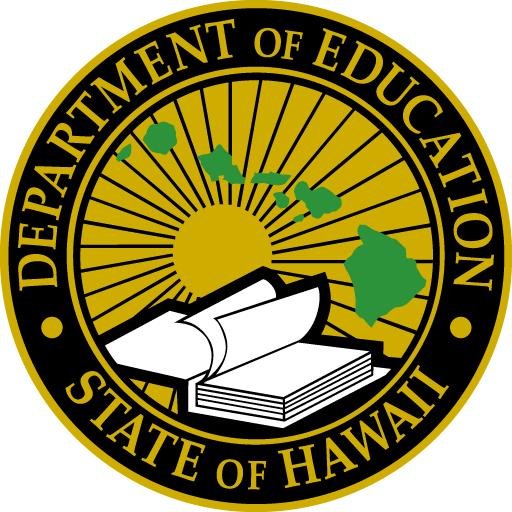E ola pono. E pag-aalaga i na piko.
Mabuhay pono. Palakihin ang mga umuunlad na koneksyon.
While the primary focus of health education is the development of health skills, these skills must be addressed in conjunction with functional information in the context of priority risk topics. Standards-based health education must be age and developmentally appropriate, medically accurate and provide factual information in all priority risk topics:
- Mental and emotional health
- Healthy eating and physical activity
- Personal health and wellness
- Kaligtasan (hindi sinasadyang pag-iwas sa pinsala)
- Pag-iwas sa karahasan
- Pag-iwas sa paggamit ng tabako
- Pag-iwas sa paggamit ng alkohol at iba pang droga
- Sexual health and responsibility
Tandaan: Edukasyon sa kalusugan in prekindergarten is aligned to the Hawaiʻi Early Learning and Development Standards (HELDS).
Mga Kinakailangan sa Kurso
- Edukasyon sa kalusugan is required in all elementary grades.
- Middle/intermediate schools must offer courses that allow all students to meet Hawaiʻi՚s health education standards and performance indicators for grades 6-8. One semester (0.5 credits; 60 hours) of health education in each middle/intermediate school grade is strongly recommended but not required.
- In high school, a one semester course (0.5 credits; 60 hours) in health education is required for graduation.
- A variety of health specialized elective courses (e.g., peer education) are available at the secondary school level.
- Para sa promosyon sa gitnang paaralan at mga kinakailangan sa pagtatapos ng high school, sumangguni sa Board Policy 105-1 Academic Program (PDF), Board Policy 102-9 Middle Level Edukasyon Promotion Policy (PDF), at Board Policy 102-15 High School Graduation Requirements and Commencement (PDF).
wellness guidelines for Edukasyong Pangkalusugan
Comprehensive health education provides the instructional foundation that prepares students to build healthy relationships and make lifelong healthy decisions. The mga alituntunin sa kalusugan support quality health education grounded in Hawaiʻi.
The wellness guidelines for health education are organized around tatlong pangunahing sangkap that address instructional minutes, include nutrition education, and emphasize culturally relevant and ʻāina-based approaches:
- Instructional content of health education classes includes a focus on knowledge and skills that support healthy eating and is aligned with the HIDOE standards for health education.
- Edukasyon sa kalusugan is provided to students in elementary grades at least 45 minutes per week and secondary grades at least 200 minutes per week.
- Nutrition education includes culturally relevant activities that are ʻāina-based and hands-on, such as food preparation, taste-testing, farm visits and school gardens.
Sexual Edukasyong Pangkalusugan
Comprehensive sexual health education helps students understand and navigate their development and growth as they progress from childhood through puberty and adolescence. Effective, comprehensive sexual health education provides students with the age-appropriate, medically accurate content and skills to know and be able to communicate for healthy relationships, access resources and support, and make healthy decisions.
Several state laws and policies help prevent teen pregnancy and the spread of sexually transmitted infections through comprehensive sexual health education.
- Batas ng estado (Hawaiʻi Revised Statutes (HRS) §321-11.1) establishes requirements for any state-funded sexual health education program.
- Board Policy 103-5 Sexual Edukasyong Pangkalusugan (PDF) requires the Department to implement comprehensive sexual health education.
- Ang isang paglalarawan ng kurikulum na ginamit ng paaralan ay dapat gawin sa mga magulang/legal na tagapag-alaga at dapat i-post sa website ng paaralan bago magsimula ang anumang pagtuturo.
- A student shall be excused from sexual health instruction only upon the prior written request of the student’s parent or legal guardian.
- Ang isang mag-aaral ay hindi maaaring sumailalim sa aksyong pandisiplina, parusang pang-akademiko, o iba pang parusa kung ang magulang o legal na tagapag-alaga ng mag-aaral ay gumawa ng ganoong nakasulat na kahilingan.
Ang mga magulang o legal na tagapag-alaga ay maaari ding mag-opt-out sa pagsali sa kanilang mga anak sa pagtuturo na may kaugnayan sa mga kontrobersyal na isyu.
Ang mga magulang o legal na tagapag-alaga ay maaaring sumulat ng isang liham sa mga administrador ng paaralan o isang guro upang hindi isama ang kanilang anak sa isang partikular na aralin o aktibidad. Kung ang naturang sulat ay natanggap, ang mag-aaral ay dapat bigyan ng alternatibong aktibidad sa pag-aaral. Ang mga magulang o legal na tagapag-alaga ay may obligasyon na ipaalam sa administrator ng paaralan o guro bago ang aralin o aktibidad.
Inirerekumendang kagamitan sa pagtuturo:
- FLASH (PDF)
- Maging Real (PDF)
- HealthSmart (PDF)
- Mga Pagpipilian sa Pono (PDF)
- Positibong Pag-iwas PLUS (PDF)
- Pagbabawas ng Panganib sa Supplement (PDF)
- Karapatan, Paggalang, Pananagutan (PDF)
Matuto pa tungkol sa Sexual Edukasyong Pangkalusugan in the HIDOE (PDF)
Sexual Violence Prevention Edukasyon
Teaching students about sexual violence prevention is essential for nurturing safe and caring schools and communities. It equips students with information and skills that promote healthy relationships and respect for others. It also helps students understand how to seek support if they or someone they know experiences sexual violence.
Nakatuon sa pag-iwas at naaangkop sa pag-unlad na pagtuturo sa pag-iwas sa karahasan sa sekswal sa mga address ng mga mag-aaral:
- awtonomiya ng katawan (hal., kamalayan at kaligtasan ng katawan, pahintulot, mga hangganan),
- pagkilala at pag-uulat ng sekswal na pang-aabuso, at
- naa-access na mga mapagkukunan (hal., pinagkakatiwalaang matatanda, mga mapagkukunan ng komunidad).
Ang mga paaralan ng departamento ay magiging responsable sa pagbibigay ng paglalarawan ng kurikulum sa kanilang mga website na nakaharap sa publiko. Bago magsimula ang pagtuturo sa mga mag-aaral, aabisuhan ng mga paaralan ang mga magulang at legal na tagapag-alaga tungkol sa paparating na pagtuturo, kung paano i-preview ang mga materyales ng paaralan, at ang proseso ng pag-opt out.
Ang isang mag-aaral ay dapat ipagpaumanhin mula sa pagtuturo sa pag-iwas sa karahasan sa sekso lamang sa paunang nakasulat na kahilingan ng magulang o legal na tagapag-alaga ng mag-aaral. Ang isang mag-aaral ay maaaring hindi sumailalim sa aksyong pandisiplina, parusang akademiko, o iba pang mga parusa kung ang magulang o legal na tagapag-alaga ng mag-aaral ay gumawa ng nakasulat na kahilingan.
Mga inaprubahang materyales sa pagtuturo:
- Elevatus Training Curriculum: Sexuality Edukasyon for People with Developmental Disabilities, Adapted for People with High Support Learning Needs (PDF)
- Labanan ang Pang-aabuso sa Bata (PDF)
- HealthSmart (PDF)
- Mad Hatter Wellness Curricula (PDF)
- NetSmartz (PDF)
- Positibong Pag-iwas PLUS, Mga Espesyal na Populasyon (PDF)
- Karapatan, Paggalang, Pananagutan (PDF)
- Second Step Child Protection Unit (PDF)
- Ang Sexual Abuse Treatment Center ng Sexual Abuse Prevention Curricula ng Sex Abuse Treatment Center (PDF)
Matuto pa tungkol sa Pag-iwas sa Sekswal na Karahasan sa HIDOE.
general health education Mga mapagkukunan
- Why Edukasyong Pangkalusugan Matters (Google Doc)
- Edukasyong Pangkalusugan Standards and Topics Overview (Google Doc)
- Learning Design for Kalusugan
- Edukasyong Pangkalusugan Printables (Google Drive)
- Mga Alituntunin sa Kaayusan
- You Matter! Kalusugan Mga mapagkukunan
- Using School Gardens in Edukasyong Pangkalusugan
- Reviewing Instructional Materials for Edukasyong Pangkalusugan (PDF)
- 2022 Hawaiʻi School Kalusugan Profiles – Highlights Report (PDF)
PAHAYAG NG HINDI DISKRIMINASYON ng USDA
Alinsunod sa pederal na batas sa karapatang sibil at mga regulasyon at patakaran sa karapatang sibil ng US Department of Agriculture (USDA), ang institusyong ito ay ipinagbabawal na magdiskrimina batay sa lahi, kulay, bansang pinagmulan, kasarian (kabilang ang pagkakakilanlan ng kasarian at oryentasyong sekswal), kapansanan, edad, o paghihiganti o paghihiganti para sa naunang aktibidad ng mga karapatang sibil.
Ang impormasyon ng programa ay maaaring maging available sa mga wika maliban sa Ingles. Ang mga taong may kapansanan na nangangailangan ng alternatibong paraan ng komunikasyon upang makakuha ng impormasyon ng programa (hal., Braille, malaking print, audiotape, American Sign Language), ay dapat makipag-ugnayan sa responsableng estado o lokal na ahensya na nangangasiwa sa programa o sa TARGET Center ng USDA sa (202) 720-2600 (boses at TTY) o makipag-ugnayan sa USDA sa pamamagitan ng Federal Relay Service sa (800) 387.
Upang maghain ng reklamo sa diskriminasyon sa programa, dapat kumpletuhin ng isang Nagrereklamo ang isang Form AD-3027, Form ng Reklamo sa Diskriminasyon sa Programang USDA na maaaring makuha online sa: https://www.usda.gov/sites/default/files/documents/USDA-OASCR%20P-Complaint-Form-0508-0002-508-11-28-17Fax2Mail.pdf, mula sa alinmang opisina ng USDA, sa pamamagitan ng pagtawag sa (866) 632-9992, o sa pamamagitan ng pagsulat ng liham na naka-address sa USDA. Ang liham ay dapat maglaman ng pangalan, address, numero ng telepono, at nakasulat na paglalarawan ng di-umano'y diskriminasyong aksyon sa sapat na detalye ng nagrereklamo upang ipaalam sa Assistant Secretary for Civil Rights (ASCR) ang tungkol sa uri at petsa ng isang di-umano'y paglabag sa karapatang sibil. Ang nakumpletong AD-3027 form o sulat ay dapat isumite sa USDA sa pamamagitan ng:
- mail:
Kagawaran ng Agrikultura ng US
Opisina ng Assistant Secretary for Civil Rights
1400 Independence Avenue, SW
Washington, DC 20250-9410; o - fax:
(833) 256-1665 o (202) 690-7442; o - email:
[email protected]
Ang institusyong ito ay isang tagapagbigay ng pantay na pagkakataon.

